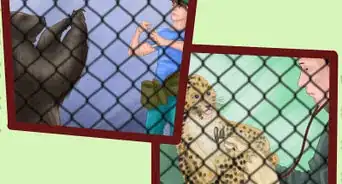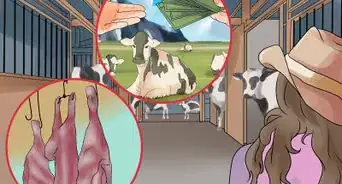wikiHow is a “wiki,” similar to Wikipedia, which means that many of our articles are co-written by multiple authors. To create this article, 13 people, some anonymous, worked to edit and improve it over time.
wikiHow marks an article as reader-approved once it receives enough positive feedback. In this case, 94% of readers who voted found the article helpful, earning it our reader-approved status.
This article has been viewed 69,900 times.
Learn more...
Zookeepers are professionals who work to educate people and care for animals in a zoo, aquarium, or animal park. Zoos employ people from a wide-variety of backgrounds, so there is no single way to guarantee a job in the field. A good education, extensive experience, and determination will help you become a zookeeper.
Steps
Getting Educated
-
1Learn about zoo keeping as a career. Before you start down the path to becoming a zoo keeper, you should know what a career in zoo keeping looks like. It is a demanding job, physically and emotionally, and you should make sure the career is right for you.
- Zoo keeping is a job that requires a great deal of physical labor. It is not a glamorous position and you will get dirty, sweaty, and tired at work. It also requires strength and flexibility. You must be able to lift at least 50 pounds.[1]
- A zookeeper's schedule is somewhat erratic. Your shifts will vary from week to week and you will likely have to work many holidays.[2]
- If you have a passion for animals, the job can be rewarding. The job does not, however, pay as much as many other professions that involve working with animals. On average, zoo keepers earn around $30,000 a year but pay does vary depending on your level of experience and the cost of living given a zoo's location.[3]
- A zoo keeper performs a wide array of tasks each day. In addition to feeding animals, cleaning exhibits and cages, and training and observation there is general clerical work required. Zoo keepers have to write field notes and proposals and converse with guests and other workers at the zoo.[4]
-
2Know the alternatives to zoo keeping. Many people love the idea of working at a zoo, but the sheer amount of physical labor and unpredictable schedule of zoo keeping puts them off. However, there are a wide array of positions needed to keep a zoo running.
- Administrative positions include directors, managers, and coordinators. For these positions, you supervise projects the zoo is undertaking, plan and execute zoo policies, recruit and maintain staff and volunteers, and help make decisions about the zoo's future.
- Curators are responsible for creation and collection. General and animal curators manage the zoo's animal collection. Exhibit and educational curators create graphics for exhibits and plan and implement educational programs throughout the zoo.
- Marketing and fundraising positions focus on raising money for the zoo, managing sales, promoting the institution, and creating ad campaigns and public service announcements on behalf of the zoo.
- Zoologists and biologists are often staffed by a zoo to provide scientific and technical assistance in regards to maintaining an environment for the animals housed. You would also conduct research on certain species.
- Veterinarians and vet technicians are usually on staff at zoos to deal with the medical needs of the animals.
Advertisement -
3Seek out formal education. There are no specific qualifications or degree paths to becoming a zoo keeper, and requirements vary from zoo to zoo. However, the more education you have fields related to animals, wildlife, and biology the better.
- If you are in high school, there are programs throughout the country where local zoos allow students to enroll in cooperative learning. Check with your own school system or browse lists online. The American Association of Zookeepers is a great resource.[5]
- Associate degrees and technical degrees targeting animal management and training, as well as zoological sciences, are a good option if you're looking to further your education beyond high school. These programs are usually 1 to 2 years.[6]
- There are four year college programs that help you prepare for a career in zoo keeping. You can get a bachelor's degree in Zoo science, Zoo management, and Zoo education at some institutions.[7]
- If your university does not offer a program specifically related to zoo keeping, a degree in Zoology, Biology, Wildlife Management, or Wildlife Ecology can be a great choice and increase your chance of getting hired by a zoo.[8]
Gaining Experience
-
1Volunteer with a zoo. Experience is important in any profession, but particularly vital in a field that requires as specific a skill set as zoo keeping. Volunteering can be a great start and can lead to internships and jobs down the road.
- Zoos usually have training sessions for volunteers. Safety is important when working with wild animals, so expect orientation to be more detailed for a zoo than for many other volunteer experiences.[9]
- Schedules are generally flexible. You can volunteer on a set schedule, like bi-weekly or bi-monthly, or you can just volunteer for special events such as pregnancy watches and animal introductions.[10]
- Make the most out of your volunteer experience. Ask questions and talk to zoo keepers about how they landed their position. Try to network and make connections you can use to land other positions later on.
-
2Intern at a zoo. An internship looks great on a resume and provides solid, hands-on experience. While internships are great for any field, as zoo keeping requires a very specific skill set it's vital to gain internship experience on your path to becoming a zoo keeper.
- The American Association of Zoo Keepers has listings of internships online with AAZK-accredited institutions. Their database is a great starting point when browsing for positions.
- Zoo keeping internships are demanding. While many internships are part-time, a zoo keeping internship is typically 40 hours a week. You are expected to work weekends.[11]
- The positions are usually unpaid, but you may get a small stipend or room and board.[12]
- Internships usually last around three months. High school and college students often find it beneficial to take on an internship over the summer.[13]
-
3Gain certifications and technical skills. Zoo keeping requires a combination of hands-on and technical skills. Bolster your resume by getting certified for things like CPR and first aid and building a computer skill set.
- You can enroll in classes to get a first aid/CPR certification. As zoo keepers need to be ready for emergencies, this will set you ahead of other applications when applying for a job. Oftentimes, college courses provide CPR/first aid certification upon completion of the course. Look for classes that offer this, as you'll gain college credit as well as a valuable career skill.[14]
- As a zoo keeper, you'll often be asked to write daily logs, take notes on animal behavior, and occasional give presentations to other staff members or guests. Proficiency in Microsoft Office programs, like Word, Excel, and PowerPoint, is a great resume builder. You can enroll in a computer studies course or try to teach yourself.[15]
Finding a Job
-
1Write your resume. A great resume is the first step to finding the perfect position, and a zoo keeper resume should highlight your experience, references, and education.
- Resumes should be written in a legible font that is modern is appearance. Avoid flowery, cursive choices and write in font size 10 or 12.[16]
- While resumes should be relatively simple, tasteful colors, graphics, and borders can help you stand out of the pile. Try a monogram of your initials in the top corner or different colored fonts for the headers. Don't go for overly flashy fonts. Stick to dark blues and purples, colors that are easy to read.[17]
- Include only the information that's relevant to the job you're applying for. A zoo does not need to know that you tended bar in college to make rent, but they will want to hear about how you volunteered at a local dairy farm on weekends during your senior year.[18]
- Write in reverse chronological order. Start with your most recent experiences and work backwards. A good rule of thumb is that your best experience should be "above the fold." This refers to what you see on the front half of a folded paper. In other words, stack your most relevant work towards the top.[19]
- Ask someone else to look over your resume, like a professor, former employer, friend, or family member. Not only can they offer suggested for tweaking the order and format, they can proofread for you. Many people become blind to their own typos when working on a document for a long time.
-
2Know where to find jobs. The job search can be overwhelming and many people do not know where to look. Have a strategy plan for finding positions.
- The American Association of Zoo Keepers is probably your best option to start. They have a comprehensive list of openings in AAZK accredited zoos that is updated year round. Browse their list to see what is available and apply to any positions relevant to your skill set.
- Talk to previous employers. If you interned or volunteered at a zoo, you should contact them and ask about openings. Even if they have nothing at the moment, if they know you're looking they might reach out to you if a position opens in the future they might reach out to you.
- Call zoos near you to see if they are hiring. Send them your resume without prompting and tell them you're looking for employment. While they might not have a position right away, if they have your information on file they might contact you for future openings.
-
3Be flexible in your search. You might not find your ideal position right away. Be willing to cope with change and less than favorable circumstances. Any job is good as it builds your resume and furthers your experience in the field.
- Zoo keepers work long hours and are expected to work holidays. If you are offered a position, be prepared for a large commitment.
- There are zoos all over the country, so you should widen your search to a variety of locations. You might have to relocate in order to obtain a job. Be prepared, financially and emotionally, for a potential move.
- Prepare yourself for a small starting salary. The salary for zoo keeping jobs is relatively low, and especially so if you're starting out. Know going in your budget will be tight, and be willing to work for less.
Community Q&A
-
QuestionHow can a 10 year old begin preparing for this job?
 Community AnswerBecause of your age, you can't intern yet. But you could volunteer at a local animal shelter with your parents or older siblings. You can also visit zoos and talk to the staff there. Ask them about the pros and cons of zookeeping. It is also a good idea to read about animals, learn some anatomy, and maybe watch some Animal Planet. When you reach high school, you can take lots of science courses and electives.
Community AnswerBecause of your age, you can't intern yet. But you could volunteer at a local animal shelter with your parents or older siblings. You can also visit zoos and talk to the staff there. Ask them about the pros and cons of zookeeping. It is also a good idea to read about animals, learn some anatomy, and maybe watch some Animal Planet. When you reach high school, you can take lots of science courses and electives. -
QuestionIf I am a zookeeper, would I be able to work with more than one species of animal?
 Community AnswerYou will most likely be expected to work with one particular group of species (big cats, canines, birds, etc.) at once, but have the opportunity to change this throughout your career. Every zoo is different, however.
Community AnswerYou will most likely be expected to work with one particular group of species (big cats, canines, birds, etc.) at once, but have the opportunity to change this throughout your career. Every zoo is different, however. -
QuestionHow can I safely deal with animals that have claws?
 Community AnswerYou should use protective gear and learn from a professional.
Community AnswerYou should use protective gear and learn from a professional.
References
- ↑ https://www.aazk.org/wp-content/uploads/keeper_information.pdf
- ↑ https://www.aazk.org/wp-content/uploads/keeper_information.pdf
- ↑ https://www.aazk.org/wp-content/uploads/keeper_information.pdf
- ↑ https://www.aazk.org/wp-content/uploads/keeper_information.pdf
- ↑ https://www.aazk.org/zoo-keeper-training/
- ↑ https://www.aazk.org/zoo-keeper-training/
- ↑ https://www.aazk.org/zoo-keeper-training/
- ↑ https://www.aazk.org/zoo-keeper-training/
- ↑ https://www.aazk.org/wp-content/uploads/keeper_information.pdf
- ↑ https://www.aazk.org/wp-content/uploads/keeper_information.pdf
- ↑ https://www.aazk.org/wp-content/uploads/keeper_information.pdf
- ↑ https://www.aazk.org/wp-content/uploads/keeper_information.pdf
- ↑ https://www.aazk.org/wp-content/uploads/keeper_information.pdf
- ↑ https://www.aazk.org/wp-content/uploads/keeper_information.pdf
- ↑ https://www.aazk.org/wp-content/uploads/keeper_information.pdf
- ↑ https://www.themuse.com/advice/43-resume-tips-that-will-help-you-get-hired
- ↑ https://www.themuse.com/advice/43-resume-tips-that-will-help-you-get-hired
- ↑ https://www.themuse.com/advice/43-resume-tips-that-will-help-you-get-hired
- ↑ https://www.themuse.com/advice/43-resume-tips-that-will-help-you-get-hired
About This Article
To be a zookeeper, start by learning about what this career entails, including a great deal of physical labor, erratic schedules, and a wide variety of tasks. Then, volunteer or intern with a zoo to gain specific skill sets, such as animal safety procedures. Additionally, get certifications and technical skills by taking a CPR class, becoming proficient with computers, and learning about animal behavior. You should also consider obtaining an Associates degree in zoological sciences or animal management, or pursuing a Bachelor’s in Biology or Wildlife Ecology. To learn how to find a job as a zookeeper, keep reading!







































































